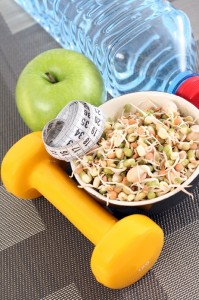When embarking on a healthy lifestyle change, it is very importance to have a set of goals in place. The purpose of goal setting is simple: to ensure clarity of vision. Clarity of vision is a key to any process as it enables those involved to behave in an efficient and effective manner. If our mission is unclear we run the risk of being distracted, procrastinating, or quitting half way through. However, if a goal is set, we know what we are doing, where we are headed, and why we are putting forth the effort.
It is critical for goals to be achievable. Many of the goals that we set for ourselves rest far off on the horizon. Too much time needs to pass before we never reach our goals. We need to learn how to “set” our goals so that they are not only achievable but also obtainable in a reasonable amount of time. If your goal is to be an Olympic weightlifter, you would not begin by trying to lift the world record. We all know that this would end in failure. However, by beginning to lift a lighter more achievable weight and then slowly building up as our body becomes stronger, anything is possible. This is why it is critical for all of us to set smaller and more realistic goals on our way to achieving those larger, more elusive goals.
Our goals must be flexible. Why? Well, let’s face it. Things may come up that will completely change our goals like struggling in balancing our health needs with our family’s demands. Whatever obstacles we encounter, our goals must be reshaped so the obstacle can be defeated and we can resume our progress.
How do we stay on track?
- Write our goals down. Write goals down often, in several different forms and put these notes everywhere. We can tape them to the mirror, fridge, and scale or put them on a post-it and stick them to our computer, work desk, and that dusty exercise machine we’ve been hiding under the bed.
- Recite our goals. This one may seem silly, but reciting our goals out loud is just another way we can process them. Recite them in the morning and right before bed. Say them out loud as you exercise and certainly remind yourself audibly when you are tempted!
- Share our goals. Don’t be afraid to share you goals with others. Tell your family, friends, coworkers, fellow church members, or whoever. Talking about our goals with others is still another way we can interact around these hopes we have for ourselves.
Every New Year, people talk about improving their health or losing weight. Here are some healthy habits to incorporate that will help you develop a healthy lifestyle and achieve your short and long term health goals:
- Empty out your pantry and refrigerator of all the processed, high-fat, high glycemic foods. You may want to donate the food to your local food pantry.
- Drink lots of water. It’s one of the easiest things you can do. Water keeps you hydrated and feeling fuller. Drink 64oz of water a day minimum.
- Plan ahead. Keep healthy, filling snacks at home and at work. Apples, oranges, celery, carrots, low-fat cottage cheese, greek yogurt, almonds, and nutrition bars, just to name a few. Then when you feel hungry, instead of making a poor decision because you have no other choice, you have a great meal or snack at your fingertips
- Don’t skip meals. Remember that skipping meals is never a good decision. It will only lead to over-eating at your next meal, so be prepared
- Plan your workouts. Whether it’s in your Blackberry or on your wall calendar, schedule a time to work out. I treat my workouts like they’re appointments, so that I take them seriously. You may also want to break goals down into weekly portions. In other words, your week 3 exercise goal may be to get 4 days of good activity in, while your week 4 goal may be to get all 5 days of activity in. You may be starting out only exercising 10 to 15 minutes a day. Your goal may be to increase your exercise program by 5 minutes each week until you reach your goal of exercising 30 minutes 5 days a week.
- Make sure to get enough fiber in your diet. Whether it’s fresh produce or whole grains, make sure you get your recommended daily intake of dietary fiber. That’s about 39g of fiber for men and 25g for women ages 19 to 50. According to the Mayo Clinic, fiber helps you feel fuller on fewer calories.
- Eat balanced nutrition. Our bodies need a balanced variety of nutrients, including the right types carbohydrates, proteins, and fats. Eat 2 to 3 servings of fruit per day and 5 to 7 servings of vegetable a day and eat protein w/ every meal and snack.
- Take high quality nutritional supplements. We can’t get everything we need from our foods. Supplementing with the right combination of vitamins, minerals and anti-oxidants is essential for optimal health.
This will get you off to a great start to setting goals you can finally achieve and developing healthy habits to feel great, have more energy, lose weight and keep it off and be Healthy for Life!
If you have any questions you can reach me at lora@thenewyoulifestyle.com or 239-898-4078 or visit me at www.thenewyoulifestyle.com.
Comments
Powered by Facebook Comments

Connect with Us on These Sites